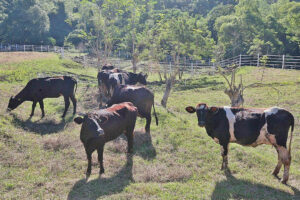THE SENATE has approved on third and final reading a bill seeking to develop a modernization plan for the livestock, poultry and dairy industries, and another bill promoting enterprise-based learning.
At the Monday plenary session, senators unanimously approved Senate Bill No. 2558, which calls for a livestock, poultry, and dairy competitiveness fund to be set up with support from import tariffs of P7.8 billion a year for the next 10 years.
“Through Senate Bill No. 2558, we will set a clear and strategic direction for the livestock, poultry and dairy industries, strengthen the organizational structure and institutional capacity of relevant agencies, and ensure that adequate resources are provided to support the growth and competitiveness of the industry,” Senator Cynthia A. Villar, who sponsored the measure, said in a statement.
It also calls for the establishment of the Office of the Undersecretary of the National Livestock, Poultry, Dairy, and other Animals Program to oversee policy geared at boosting production in these industries.
These policies will be focused on benefiting small-scale farmers and organizations engaged in these industries, as duly accredited by the Department of Agriculture.
Legislators also approved Senate Bill No. 2587 or the proposed Enterprise-Based Education and Training Framework Act, which will set up a roadmap for programs promoting industry-driven skills building programs for the workforce.
The measure seeks to bridge the gap between the needs of industry and worker skills.
“While there are many workers who accept jobs that are not commensurate with their qualifications, there are also many workers who lack the required skills,” Senator Emmanuel Joel J. Villanueva, the bill’s author, said in a statement.
President Ferdinand R. Marcos, Jr. has said his government aims to create at least three million new jobs through upskilling and reskilling programs.
Also on Monday, Senators approved on second reading a bill creating a framework for a blue economy, which will seek to preserve and sustain the Philippines’ ocean-based resources.
The blue economy is an economic model seeking the sustainable utilization of ocean resources through green infrastructure and technology.
Under Senate Bill No. 2450, the government is tasked with drafting a plan to manage marine and coastal resources while coming up with policies to mitigate land and sea-based pollution as well as overfishing. — John Victor D. Ordoñez
